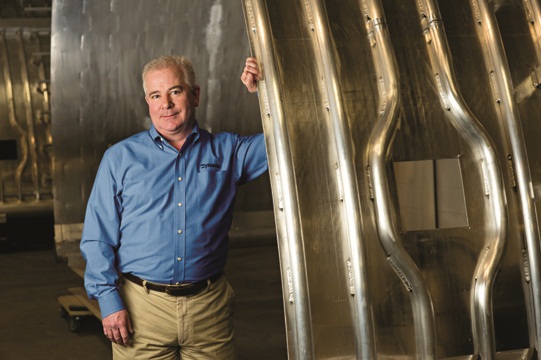Keeping it cool is a big part of Tom Foley’s (BS, Industrial Technology, University College ’87) business. He’s the chief executive officer of Hingham, Massachusetts-based Dynavac, a manufacturer of high vacuum systems for thin film deposition, space simulation, and custom-engineered applications.

Tom Foley, CEO, Dynavac
The company has developed an expertise working in a cold climate. Among the company’s current projects is a cryogenic enclosure to support testing of the new James Webb Space Telescope (JWST). The JWST will be capable of viewing deep into the infrared spectrum, which requires it to be preflight tested to 30K (-405.4°F). Cooled by a helium refrigeration plant, the 45 foot diameter, 60 foot high aluminum structure will be installed in a large vacuum chamber at NASA’s Johnson Space Center in Houston, Texas. The chamber was originally built for the Apollo program in the 1960s and is being upgraded to support the JWST program.
“It’s exciting to be part of such an historic program, and we are very proud of our contribution,” says Foley.
Another current project is a large coating system for Lilliputian Systems, Inc., of Wilmington, Massachusetts, the developer of the world’s first Personal PowerTM solution for consumer electronics. Dynavac’s equipment will be used to support production of their emerging technology products, which are being targeted to the $50 billion portable power market.
Simply put, Dynavac provides the process and test equipment that is necessary to manufacture complex products. As Foley explains, “We don’t make the products; we make the machines that make the products.”
Foley began his career as an apprentice machinist, working for High Vacuum Equipment Corp., where he became intrigued with the vacuum industry and its many applications. Foley realized that if he wanted to advance his career in this field, acquiring the right education was imperative. He discovered University College would allow him to continue working full time while pursuing his degree, and began attending classes at Northeastern University’s satellite campus in Weymouth.
“The program did a good job of providing core subject matter that was necessary to compete in a business environment,” says Foley. “One difference from a traditional day program was the fact that I was working full time while attending classes in the evening. This provided a tremendous opportunity to apply what I learned to an actual working environment. It was like a perpetual co-op program.”
Looking back, Foley admits that while the intensive daily routine of a UC student wasn’t easy, it did help him develop skills that he would later apply throughout his career. “Between a full-time job and evening classes, you had no other life,” he explains. “It gave new meaning to ‘total immersion.’ This may have fostered an intensity that became useful in dealing with challenging situations.”
Among those challenging situations is running a successful business. Acknowledging regulatory and competitive challenges, Foley believes the United States is a very favorable environment for running a business. He stresses that in order to be successful, a company must be driven by customer satisfaction, committed to continual improvements in quality and efficiency, and maintain a capable and motivated workforce.
Foley acknowledges the complex impact of the global economy on all businesses including Dynavac’s. He points to the pressure of foreign competition and the inevitable migration of production jobs as the United States emerges into a postindustrial society.
“On the other hand, the global economy presents new opportunities,” he explains. “Emerging markets become consumers. Knowledge and equipment are needed to operate their factories. I believe that there is also a benefit from the exchange of ideas. Many of our current management principles came from Japanese manufacturing philosophy. Continual improvement, lean manufacturing, and total quality management form the mantra of most modern management systems—all originated from Japanese industry.”
Northeastern University’s College of Professional Studies (CPS) is committed to providing career-focused educational programs that are designed to accommodate the complex lives of motivated learners. Offered in a variety of innovative formats, CPS courses are taught by accomplished scholars and practitioners who have real-world experience. The result is an educational experience founded on proven scholarship, strengthened with practical application, and sustained by academic excellence.
Northeastern University is a global university with a tradition of partnership and engagement that creates an innovative, distinctive approach to education and research. Northeastern integrates classroom studies with experiential learning opportunities in 70 countries, and pursues use-inspired research with a focus on global challenges in health, security, and sustainability.